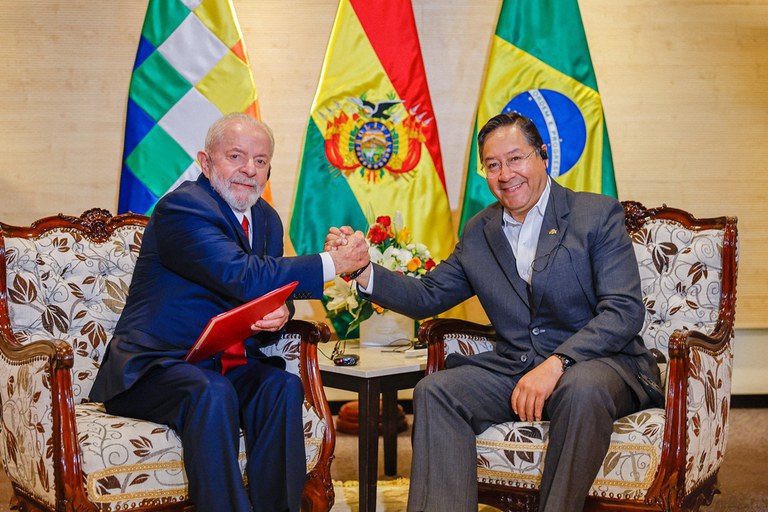Notícias
FOREIGN AFFAIRS
Lula: "We are beginning a new era in Brazil-Bolivia relations"

Presidents Lula and Arce during bilateral meeting: integration and partnerships - Credit: Ricardo Stuckert / PR
President Luiz Inácio Lula da Silva met with Bolivian President Luis Alberto Arce on an official visit to Santa Cruz de la Sierra on Tuesday, July 9. The leaders discussed the expansion of bilateral relations and cooperation to foster mutual economic development through physical and energy integration. One of the agreements signed between Brazil and Bolivia aims to strengthen border operations to combat drug and human trafficking.
"We are beginning a new era in Brazil-Bolivia relations. We are convinced that integration is no longer just rhetoric for election campaign speeches. Integration is a necessity for the survival of South American countries. We know that what we are doing here aims to improve the quality of life of the people of Bolivia and the quality of life of the people of Brazil," said Lula in a statement to the press.
We are convinced that integration is no longer just rhetoric for election campaign speeches. Integration is a necessity for the survival of South American countries. We know that what we are doing here aims to improve the quality of life of the people of Bolivia and the quality of life of the people of Brazil"
Luiz Inácio Lula da Silva, President of the Republic
>> President Lula's speech in full
The Brazilian leader said the energy transition represents a window of opportunity for Brazil, Bolivia and for other South American countries. "We do not have the technological wealth of other countries, but we do have the riches that nature has bestowed us and that the world needs. Whether in food production, the production of critical minerals, the production of green hydrogen, wind, solar, biomass or biofuels. We have to offer the world what they need," he argued.
DEMOCRACY — During the meeting, President Lula reaffirmed Brazil's support and solidarity with President Arce and the Bolivian people, after the attempted June 26 coup d'état. "After 15 years since I was last in Bolivia as president, my visit symbolizes more than the resumption of a friendly relationship. It represents the communion of two countries whose histories have important parallels. Just as in Brazil, Bolivian democracy has prevailed after a long road interspersed with coups and dictatorships," he said. The president of Bolivia has visited Brazil four times over the last year, which underscores just how close this bilateral relationship is.
The Bolivian leader thanked Lula for his visit, for Brazil's role in bringing Bolivia to Mercosur, and for the fact that the Brazilian president spoke out against the June 26 coup attempt. Arce said today marks the beginning of a new foreign affairs era between the two countries, which should extend far beyond Bolivia’s role as Brazil's main natural gas supplier.
"Brazil and Bolivia used to have a relationship that was centered on the gas issue. Now, from Brazil's current perspective, from its command, we know that Bolivia is not just about gas. For us Bolivians, physical integration is important. Integration is on the agenda so that we can reach the Pacific and the Atlantic, and Bolivia can play an important role in this. We are the most direct transit, the fastest way for Brazil to connect to the Pacific. And you are also the fastest way for Bolivia, through its rivers, to reach the Atlantic. In this complementarity of needs, we can move forward," stated Arce.
COOPERATION — The Bolivian president also said that the country is starting an industrialization process and needs Brazil's experience in this area, especially in the basic chemical and pharmaceutical industries. He pointed out that the country will continue to explore, produce and sell gas, but is now also focusing on raw materials such as lithium and other minerals. At the meeting, the heads of State discussed the possibility of expanding investments in natural gas and increasing the volume exported to the Brazilian market. Brazil also wants to strengthen the implementation of a nitrogen factory between Corumbá, in Mato Grosso do Sul and Puerto Quijarro, to produce fertilizers.
PHYSICAL INTEGRATION — Physical integration projects were also the subject of the meeting. "Bolivian engagement is key to completing the set of routes that Brazil has called the Rondón Quadrant. With the construction of the binational bridge over the Mamoré River, the transportation of goods will be cheaper, benefiting in particular the states of Beni and Pando (in Bolivia) and Rondônia and Acre (in Brazil). Brazil's proposals to improve navigability on the Tamengo canal and the Paraguay River are also aimed at facilitating our connection," said Lula.
AGENDA — Lula's agenda in Bolivia – the country with which Brazil shares its longest border, over 3,400 kilometers – included a restricted meeting with Arce, followed by an extended meeting with authorities and part of the Brazilian delegation. After attending a lunch hosted by the Bolivian president, President Lula is expected to meet with social movement leaders. Lula will then take part in the Bolivia-Brazil Business Forum, organized by the Brazilian Trade and Investment Promotion Agency (Agência Brasileira de Promoção de Exportações e Investimentos /ApexBrasil), in partnership with the Ministry of Foreign Affairs (MRE).
BILATERAL TRADE — Top Brazilian exports to Bolivia in 2023 included iron and steel bars, rods, angles and profiles (6.1%), edible products and preparations (5.3%), other products from the manufacturing industry (4.8%), automotive passenger vehicles (3.8%), and fuel oils from petroleum or bituminous minerals (3.8%). Top Brazilian imports from Bolivia in 2023 were natural gas (86%); manure or fertilizers (4.8%); other extractive industry products (2.6%); petroleum gas and other gaseous hydrocarbons (1.1%).